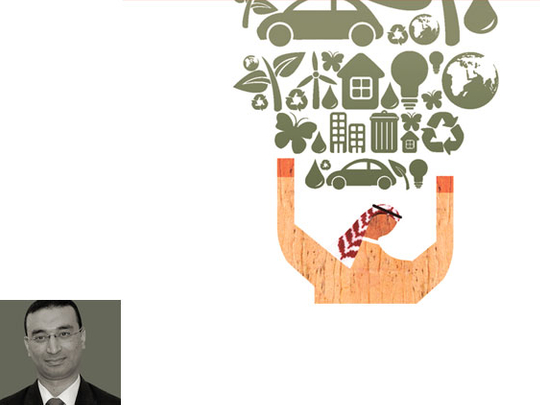
The United Nations has announced that 2012 is the "International Year of Sustainable Energy for All". Renewable Energy (RE) plays a vital role in the effort to achieve sustainable energy globally. The Arab world has a huge potential to develop RE, especially solar and wind energy that can help in achieving sustainable development, and addressing the problems of water demand, energy security and climate change. Globally, RE currently amounts to 20 per cent of the final energy consumption, as RE technologies are becoming increasingly sophisticated. The world will invest $5.5 trillion (Dh20.19 trillion) in renewable energy by 2030, according to an estimate by the International Energy Agency (IEA).
All applications of solar power, especially the two common methods, Concentrated Solar Power (CSP) and Thin Film PV Cells, are feasible and applicable in the Arab world. CSP requires large-scale plants in the desert and the Thin Film PV Cells can play an important role in generating electricity in buildings as well as in remote rural communities, which are not connected to the grid, and thus help in achieving self-sufficiency. It is worth mentioning that new applications can depend on hybrid stations that work on solar power in the morning and by wind power during the evening.
There are many challenges as some types of RE require more time to become available on a commercial scale. More research in this field is required to help cut costs. In addition, there is a serious need to correct market distortions that favour fossil fuels.
Another obstacle is awareness, as it is clear that the majority of consumers do not care where the energy they use comes from. Much remains to be done to change the behaviour of consumers and instil in them environmental consciousness, which will ultimately benefit them, their countries and the entire world.
Without doubt, there is a pressing need for a number of enabling conditions in order to make RE competitive and profitable. Price-based subsidisation (feed-in tariff), incentives and financial mechanisms that support RE are a must to overcome the obstacles and to embrace the potential.
Enormous potential and manifold benefits
The electricity sector is not yet in tune with wider redeployment of RE, in terms of regulations, infrastructure and governance in general. Even though the costs are coming down drastically, it might take some more time to establish their economic viability. But this has to be done with massive support from the governments. Thus Arab countries should ensure they link RE to networks, as well as have a long term agreement between private developers and government electricity companies to guarantee selling the power generated at a viable price.
The price of electricity coming from RE will be substantially reduced, and will, in the end, become very competitive as a result of lessons learned from experience, economy of scale, mass production, and growth of technology etc. However, there are many challenges facing the transition, including the issue of technology transfer and localisation. It is hoped that the region will be the exporter of such technologies in the future and initiatives such as Masdar are already playing a vital role in this field. It is ironic that though the Arab world has been a major producer of oil and desalinated water for the past 70 years or so, most of the technology used in these fields is still imported.
Environmental issues like greenhouse gas emissions and climate change as well as the concerns about fluctuations in oil price and the sustainability of the hydrocarbon reserves, are accelerating the march towards renewables. RE has enormous potential and manifold benefits for Arab countries; it can attract foreign investment, transfer the economy to a low carbon one and provide adequate and clean energy, which is an essential component of efforts to alleviate poverty, improve quality of life and ensure sustainable societies.
Green jobs can be related to all sectors in any economy, especially in the RE sector. There will be massive employment opportunities in this field in the future, which should be a motivation for countries. From a job creation point of view, research shows that for every one megawatt of solar energy, 15 jobs would be created across the value chain. Green jobs are jobs in any business or economy sector that provide real income generation opportunities, while reducing negative environmental impact, ultimately to sustainable levels.
Green jobs creation is vital for the Arab world. It is very clear that decent work, adequate wages, safe conditions, workers' rights, social dialogue and protection were the root causes of the Arab Spring. Thus RE can play an important role in fulfilling people's aspirations and demands.
Currently Arab countries have initiated some pilot projects: Morocco plans rural PV electrification, wind farms, CSP, generating 4,000 megawatts by 2020, Egypt's wind farms, CSP will generate 7,200 MW by 2020 and Algeria plans on generating 13,000 MW by 2030. All Arab countries lack inclusive and good governance. Some have targets without policies. Other countries lack both targets and policies, such as Yemen, Syria, Sudan and Lebanon.
In June this year, Brazil will host the Rio+20 "Earth summit". The discussions will include RE and green jobs as priority areas identified by governments as well as various stakeholders (i.e. major groups such as youth, children, women, business and industry leaders, trade unions, the scientific community etc.
Last but not least, it is essential that the Arab world use the wealth from traditional energy sources (oil and gas) for the transition towards RE. In addition, establishing good governance for the RE sector is perhaps the single most important factor in promoting it in the Arab World.
Dr Mohamed Abdel Raouf is an independent environmental researcher.











